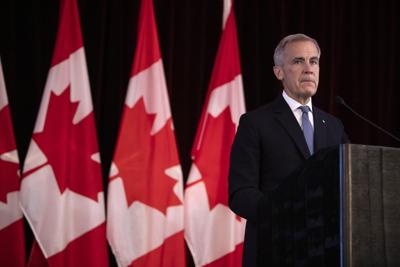OTTAWA - Eleven Indigenous leaders from across the country were named to the federal government’s new Indigenous Peoples’ Council on Wednesday, tasked with advising the new federal body working to fast-track major infrastructure projects.
The federal government says the council will work with Indigenous Peoples to integrate the United Nations Declaration on the Rights of Indigenous Peoples into government decision-making on major projects.
It’s creation was a promise made to Indigenous Peoples as the government pushed through its major projects bill, which caused an outcry in many Indigenous communities as people feared it could impact their rights and permit projects without fair consultation.
The law was passed, with support from the Conservatives, less than a month after it was introduced. It allows cabinet to quickly grant federal approvals for big industrial projects that are deemed to be in the national interest, including by sidestepping existing laws.
Trevor Mercredi, Grand Chief at Treaty 8 First Nations of Alberta, is among the 11 new members of the advisory council, and was one of the leaders who expressed concern about the bill. At a July meeting between First Nations chiefs and the federal government, Mercredi said Carney had a “big job to do” to regain their trust.
ÔÇťWe came out here to assert our rights. We didnÔÇÖt come out here to ask questions. We didnÔÇÖt come out here to put our hands out. We simply came here to assert our rights and make sure that each and every person understands what theyÔÇÖre in for if theyÔÇÖre coming for our resources,” he said at the time.
Whitecap Dakota First Nation Chief Darcy Bear, who was invested into the Order of Canada last year for his work on economic development in First Nations, is also among the council members.
Crystal Smith, the former chief of the Haisla Nation and board member of the First Nations LNG Alliance, was also named to the council. In a recent article, Smith said that Canada’s trouble getting major projects built over the last decade was due in large part to not engaging fully with Indigenous communities to understand their interests.
Seven council members are from First Nations, two are Inuit and another two are M├ętis.
In a news release announcing the council, Prime Minister Mark Carney said partnerships with Indigenous Peoples and nations are going to be critical to moving his major projects agenda forward, and that the insights provided by the council will help ensure prosperity for Indigenous communities.
Ottawa says the members of the council “were selected based on their expertise and knowledge of major projects, Indigenous rights, and the regulatory space.”
The council will meet at least four times per year in-person, with virtual meetings to be held “as required.”
Assembly of First Nations Yukon Regional Chief Kluane Adamek was also named to the council, where she serves as the portfolio holder for climate change and the environment. 
JP Gladu, who previously served as the president and CEO of the Canadian Council for Aboriginal Businesses, similarly secured a seat, along with Lorne Pelletier, the senior economic adviser for the Manitoba M├ętis Federation.
Dawn Farrell, the former Trans Mountain executive who was named CEO of the office last month, said in a statement “their expertise and advice will be critical to ensuring that projects of national interest are built fast, built right, and built in a way that creates real opportunity and prosperity for First Nations, Inuit, and M├ętis.”
One Indigenous group who didn’t secure representation in the council spoke out Wednesday evening, saying their exclusion undermines reconciliation and weakens the nation-building projects the government is seeking to progress.
ÔÇťAs the government of the M├ętis Nation within Alberta, representing the largest Indigenous population in Canada, the Otipemisiwak M├ętis Government must be included on the Indigenous advisory council to reflect the vital and historic role our citizens have played, and continue to play, in building Canada,ÔÇŁ said President Andrea Sandmaier of the Otipemisiwak M├ętis Government, which represents M├ętis in Alberta.
“We have supported CanadaÔÇÖs economic agenda in good faith, including through our participation in the Canada-M├ętis Summit and discussions on the Building Canada Act. Now, we need to see that commitment reflected through the meaningful inclusion of Alberta M├ętis in decisions that directly affect our citizens.”
This report by The Canadian Press was first published Sept. 10, 2025.
Error! Sorry, there was an error processing your request.
There was a problem with the recaptcha. Please try again.
You may unsubscribe at any time. By signing up, you agree to our and . This site is protected by reCAPTCHA and the Google and apply.
Want more of the latest from us? Sign up for more at our newsletter page.





















To join the conversation set a first and last name in your user profile.
Sign in or register for free to join the Conversation